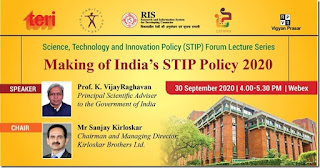Follow Us: @IndiaSTS | http://twitter.com/IndiaSTS | http://www.facebook.com/csspjnu/ | http://www.mixcloud.com/cssp_jnu/
Tuesday, September 29, 2020
Thursday, September 24, 2020
ISB Open Data Conclave | 25th September | Online
|
Monday, September 21, 2020
CODATA Connect Webinar on Urban Data Space as New Frontier: A Responsible Research and Innovation Perspective | Today at 6:30pm
CODATA Connect Webinar on Urban Data Space as New Frontier: A Responsible Research and Innovation Perspective
Registration Link: https://attendee.gotowebinar.com/register/5174111913579989262
This talk focuses on the emerging phenomena of Urban Data Space (UDS) technology and investigates how UDS may be developed with taking a responsible research and innovation perspective. Data Space is one of the frontiers of innovation in digital technology that aims at creating „a seamless digital area with the scale that will enable the development of new products and services based on data" (EC 2018). The major idea of these is to openly provide large quantities and multiple types of data for governments, industry and other actors in order to innovate: develop new services and products or link existing sectors. Smart City projects intend to manage Big Data in urban environments and face similar challenges of organizational complexities. UDS is suggested to facilitate an eco-system for data exchange and added value creation utilizing the various types of data within a smart city/municipality. Dataspaces/UDS raise not only technical challenges (interoperability, standardization etc.), but are entangled with questions on social and governance aspects relevant for the constitution of modern societies. It is important to note that knowledge and value chain gaps regularly lead to policy procrastination, as lack of shared positions of academia and/or business hinders policy makers to even understand, let alone address the governance challenges of Data Space technology. As Data Space technology is at Technology Readiness Level (TRL) 3-4, it is essential to address, besides the semantic assessment of Big Data structures, semiotic research in dataspace technology. This would require the assessment of the 'sign relational complex' or, according to semiotic theory, the pragmatics of data science: ascertaining, assessing and researching the processes by which signs relate to the agents who use them to refer to things in the world and to communicate their intentions about those things to other agents who may have similar or different intentions concerning the same or different things. This also brings about ethical and responsibility concerns: Does UDS lead to an integration of stakeholders? Does it offer a new sphere for stakeholders' creativity, participation and new formats, modes for engaging those in the urban public sphere who previously were not involved? Or might UDS, as we have seen in other social spheres affected by the current Corona crisis, highlight and enlarge existing partitions in society? An RRI-inspired UDS approach would mean trying to make UDS more inclusive, decision-makers and other key stakeholders' attitude to their work more reflective and suggest political and policy implementation processes in UDS that are more responsive to societal needs and ethical concerns. This talk will focus on using the RRI-heuristic provided by Owen et al. to identify some challenges and to reflect on the responsibilities of various actors involved in UDS R&I. We will also point to a new tool: the "societal readiness thinking tool" developed in the NewHoRRIzon project as a potentially important way to address the looming questions of responsible innovation related to UDS.
 Name of the Speaker: Robert Braun
Name of the Speaker: Robert Braun
Associate Professor/Senior Researcher, Deputy Head, Techno-Science & Societal Transformation, Institute for Advanced Studies (IHS), Vienna, Austria
Robert studied philosophy of arts and history at the University of Budapest, in 2002 he did his PhD in philosophy. 1991-94 he was assistant professor at ELTE University of Budapest. From 1994-2019 he was Associate Professor at Corvinus University in Budapest. From 2015-2018 he was Professor at Lauder Business School in Vienna. He was Pro-Rector of International Business School in Budapest 2014-2015. He is currently senior researcher at the Institute for Advanced Studies in Vienna and Associate Professor at Masaryk University in Brno. He did research at Rutgers University in the US, at the Institute of Advanced Studies in Wassenaar, Netherlands, and taught at numerous universities in the EU and the US. His research projects involve the representation and engagement of stakeholders in corporate communities as well as the societal impacts of (autonomous) mobility. His core research interest is in the politics of societal transformation. His past research includes the politics of historiography [creation of power/knowledge and meaning in relation to the past]; the politics of corporations [creation of power/knowledge through social exchange/business]; and, currently, the politics of autonomous mobility [creation of power/knowledge through technology]. His last book was "Corporate Stakeholder Democracy," published by CEU Press in 2019; his new and forthcoming book (written with Richard Randell) is on "Dromobility: Towards post-automobility" with Rowman & Littlefield International.
Some of Robert's recent papers:
- Science Magazine: https://science.sciencemag.org/content/369/6499/39
- Doing and managing research responsibly online: https://www.tandfonline.com/doi/full/10.1080/23299460.2020.1789387
- Social labs as inclusive method: https://irihs.ihs.ac.at/id/eprint/5391/1/timmermans-blok-braun-et-al-2020-social-labs-responsible-research.pdf
Web: https://www.ihs.ac.at/people/robert-braun/
___________________________
Thursday, September 17, 2020
Webinar on "Urbanisation and Technology" Today at 6.00 PM (IST)
| ||||||||||||||||||||||||||||||||||||||||||||||||
|
Major progress in UNESCO’s development of a global normative instrument on the ethics of AI
UNESCO Press Release No.2020-89
Major progress in UNESCO's development of a global normative instrument on the ethics of AI
Paris, 17 September — When UNESCO's Member States decided to launch the process of developing a global recommendation on the ethics of artificial intelligence (AI) in November 2019, the United nations Secretary-General Antonio Guterres congratulated the Organization for taking up this challenge, declaring that "artificial intelligence is a critical frontier issue for the whole UN system and the whole world."
UNESCO in March this year asked 24 leading experts with multidisciplinary experience in the ethics of artificial intelligence to develop a draft recommendation on the ethics of AI.
UNESCO then launched a wide process of consultations to obtain the many points of view of stakeholders. This involved experts from 155 countries, members of the public (through a global online survey), United Nations agencies, major stakeholders from the sector such as Google, Facebook and Microsoft, and the world of academe with the University of Stanford and the Chinese Academy of Sciences.
The resulting draft recommendation was today submitted to UNESCO's 193 Member States. Negotiations are planned ahead of its planned final adoption by Member States at the Organization's General Conference in November 2021
'We must make sure Artificial Intelligence is developed for us and not against us' declared UNESCO Director-General Audrey Azoulay. "We need a robust base of ethical principles to ensure artificial intelligence serves the common good. We have made this process be as inclusive as possible since the stakes involved as universal," she explained.
Over recent years and all the more so since the outbreak of COVID-19, there have been ever more applications drawing on AI, notably with the aim of accelerating research into vaccines and improving tracing of the virus. AI has contributed to the development of telemedicine and distance learning. It has also been used to operate drones for the delivery of medical supplies and the need for a global regulatory instrument has grown on a par with the spread of AI applications.
The potential of artificial intelligence, as described in both scientific publications and works of fiction, gives rise to fear that machines will take decisions out of human hands, that it will erode individuals' right to and that it will expose people to manipulation to the detriment of their rights and freedoms. The massive quantity of data collected and processed daily raises major concerns over confidentiality, privacy, and the reproduction of discriminatory practices and stereotypes.
The draft recommendation submitted to the international community establishes a number of over-arching concepts:
- Proportionality: AI technologies must not exceed what is necessary to achieve legitimate aims or objectives, and should be appropriate to the context.
- Human oversight and determination: humans are ethically and legally responsible for all stages in the life-cycle of AI systems.
- Stewardship of the environment and peace: throughout their life-cycle, AI systems must contribute to the peaceful interconnectedness of all living creatures with each other and respect the natural environment, notably with regard to the extraction of raw materials
- Gender-inclusion: AI technologies must not reproduce the gender inequalities found in the real world, notably with regard to salaries, representation, access, and stereotyping. Political actions, including measures of positive discrimination, are required to avoid these major pitfalls.
UNESCO will assist governments and civil society players (corporations, members of the public etc.) in developing concrete awareness-raising campaigns and ethical impact assessment tools for AI in all fields.
Beyond wishing to establish international consensus on the subject, UNESCO's experts urge Member States and AI players further to raise public awareness and stress that is important for everyone to be made aware of their digital rights.
****
Media Contact: c.o-hagan@unesco.org
+44 7715 991279
UNESCO, 7, place de Fontenoy, PARIS, NA FRANCE France






